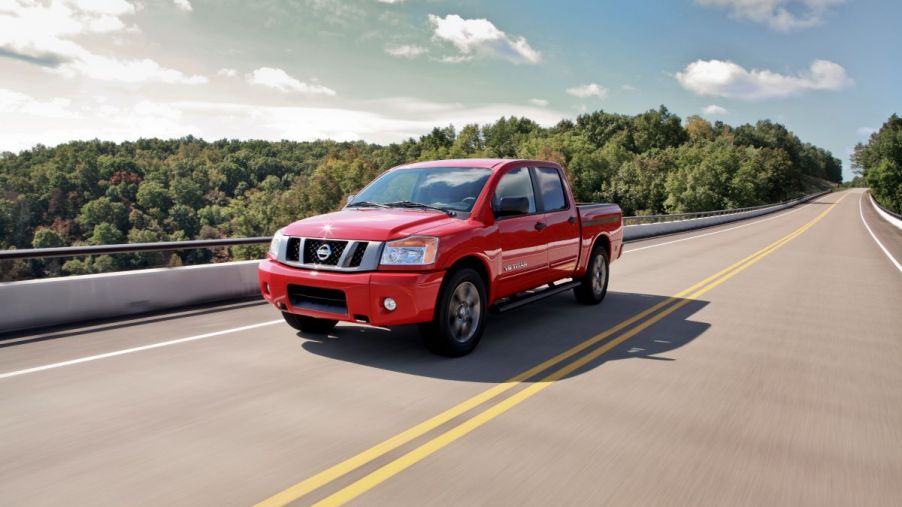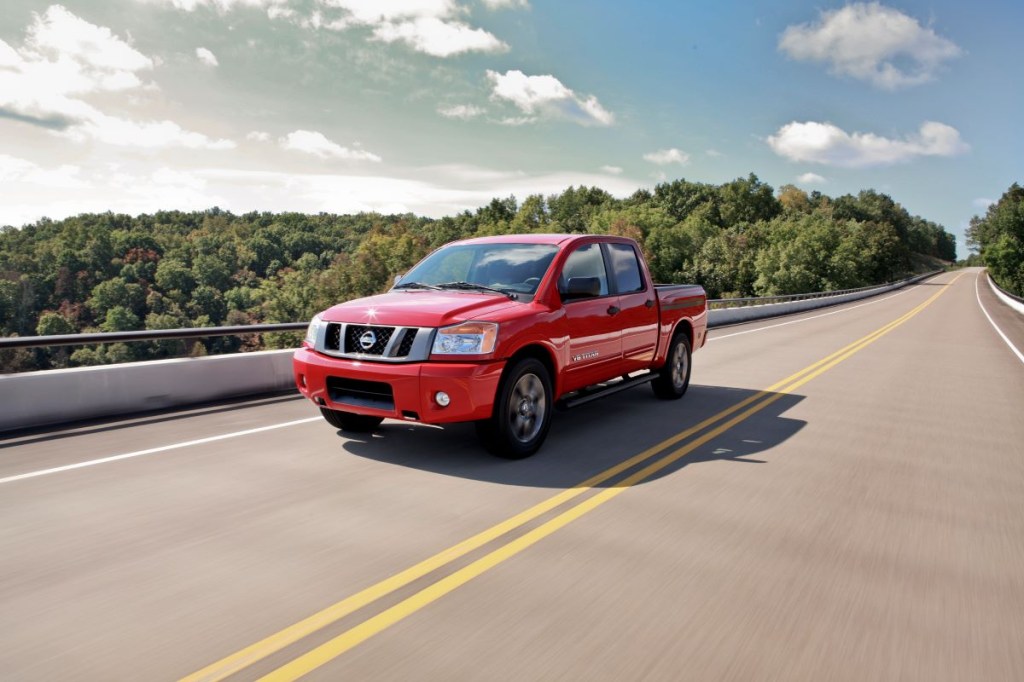
Watch Out for These 4 Common First-Gen Nissan Titan Problems
The first-gen Nissan Titan was introduced in the 2004 model year, running through 2015. Praised for its standard 5.6-liter V8, spacious cabin, and overall rugged design, it was an earnest alternative to Detroit’s Big Three. Their relative inexpensiveness on the used market means potential buyers can easily obtain a long-lasting full-size pickup truck. But be sure to keep an eye out for these four common first-gen Nissan Titan problems.
1. Transmission issues
Bolted to the back of that 300-plus-horsepower 32-valve V8 is a five-speed Jatco automatic. Unfortunately, it was a weak point and one of the most common first-gen Nissan Titan problems. The cooling system of the transmission is connected to the truck’s radiator. Internally, a crack will develop when the transmission fluid runs through the radiator, causing fluid to evacuate.
One of the ways to know if this problem exists is if the transmission is overheating or shifts hesitantly into the gears. Also, if the radiator coolant reservoir is low, you’d be better off checking the transmission fluid. When the engine cranks, the five-speed will suck in coolant from the reservoir due to the crack. Catching the issue in time is the difference between a new radiator and a transmission flush or an entire rebuild.
2. Low fuel pressure
At idle, a first-gen Nissan Titan’s fuel pressure should be in the 50-55 psi range. If the number is lower, drivers will notice a lack of power from a lean fuel-to-air mixture. Replacing the fuel pump early is essential because repair bills can skyrocket.
If left unattended, the Titan’s catalytic converters will be damaged—and that’s converters with an “s.” Four-wheel drive Nissan Titans have four of them. The two-wheel drive truck has two cats and two resonators. Given that each is several hundred dollars, it’s an easy way to save on rising maintenance costs.
3. Differential Failure
Probably the most complained about and most common first-gen Nissan Titan problem is a complete mechanical failure at the truck’s rear. An automatic brake-limited slip differential was available on all Titans, but a weak point was insufficient axle vents. As can be expected, when pressure builds in the rear axle, it’ll begin to leak fluid through the seals.
There’s really no way to fix the design flaw apart from making the vents larger. That’s probably not something a first-time novice can master. However, it’s best to have a professional work something out instead of paying to replace the rear seals every 10,000-15,000 miles.
4. Suspension troubles
Finally, suspension problems are another common first-gen Nissan Titan problem. Owners on CarComplaints have reported that the truck’s suspension can become noisy or make a “clunking” sound, especially when going over bumps or rough roads. Others say their suspension components—ball joints, tie rods, control arms, shocks—wear out quickly, requiring frequent repairs or replacements.
Suspension problems can be caused by several factors, including low-quality suspension components, damage caused by heavy towing, or a lack of maintenance. However, some vehicle deterioration may have been due to a lack of proper welds on the lower control links assembly onto the chassis. In 2010, the NHTSA (National Highway Traffic and Safety Administration) issued two recalls on the Titan’s feeble weld—for the 2004 model year through the 2010 model year.
Should you let common first-gen Nissan Titan problems dissuade you?

While the first-gen Nissan Titan is a powerful and capable truck, it’s not without problems. There are more, but appalling interior quality aside, the four mentioned are the most serious. But critically, all of them can be fixed.
To prevent these problems, owners should have their trucks inspected regularly and perform routine maintenance. This includes checking fluid levels or their corresponding damp spots on the ground, as well as signs of wear or damage on other components. By taking these steps, Nissan Titans will run smoothly and reliably for years to come.


